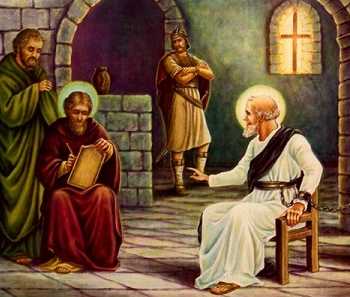Endings are hard. If an ending does come in our lives, we like to tie it up neatly. But rare is the ending which ends..PERIOD. There are always commas, parts of the old we bring into the next step. Beginnings can be hard, too, especially if what we face is something difficult.
Today’s readings are the endings of the book of Acts and of John’s Gospel. Today is the ending of the Easter season. Tomorrow is Pentecost Sunday, our celebration of the beginning of the church and the baptism of the Holy Spirit on its members.
Today our scripture writers bring their stories to an end which is very much not an ending. It is the kind of ending serial writers use: they end the current story and tie up loose ends, but they also lay the groundwork for a new story. We learn that Paul was given substantial freedom when he arrived in Rome. He received visitors and “without hindrance he proclaimed the Kingdom of God and taught about the Lord Jesus Christ.”
Tradition says St Paul was martyred, along with St. Peter, during the persecution of Nero around AD 64-68, but that is not how the book of Acts ends. It ends with Paul continuing to work steadily and successfully as he awaits trial and likely death.
The scene in the gospel is a continuation of Peter’s conversation with Jesus in yesterday’s gospel on the seashore. It follows right after when Jesus asked Peter three times, “Do you love me?” and, when Peter said yes, told him, “Tend my sheep, feed my lambs.” Jesus has told Peter that he will die a martyr’s death. Peter wants to know about John: will he die, too? Jesus says, “That’s not your concern, Peter. Your concern is to do what I tell you to do: Tend my sheep.”
Endings are hard. Even when they contain the groundwork for the next part of the journey. We worry the next part of the adventure is going to have difficulties. We temporarily forget that the current chapter of our lives has had difficulties. The unknown lies in front of us like a great, wide sea. We feel small and uncertain. Like Peter, we want to ask, “What does the future hold? How can I be sure everything will be all right? Reassure me, Lord!”
That’s not how it works. Our Lord knows that we tend to awfulize change.
Like Paul, when change comes or the future seems ominous, we simply need to settle down in the situation God has placed us, establish positive relationships with the people God puts in our lives, make the most of our current circumstances, and get to work “proclaiming the Kingdom of God.”
Because God will take care of us. That is the quiet, almost hidden message in today’s readings: God will take care of us—even when dark times come. God is the author of history. He moves through time, working with Peter and Paul, working with saints and sinners through the ages, working with you and me. We build the Kingdom.
This afternoon I will spend time with people in our parish who are “caregivers.” They each have a husband, wife, or parent who is chronically ill and requires 24 hour care. They come together once a month to talk with others who readily understand about how hard it is to keep loving when love means changing wet sheets, spoon feeding, getting up multiple times in the night, and doing it by yourself again and again and again.
They talk about the tedium of it all—how it just seems to go on forever. They also talk about how the experience has deepened their capacities to love and to see God in all things: they rejoice at a bowel movement, at pills that stay down, at a walk across the room. They learn patience and appreciation of the birds that frequent the bird feeder outside their kitchen window or a neighbor who comes by to visit for just a few minutes. They find themselves in ongoing conversations with God throughout the day.
They find, in their difficult circumstances, that God is providing for them. Their ending time is a transition time—to eternal life eventually for the one they care for, and to their own greater capacity to love. We have talked about how it seems they are outside the mainstream of life, but, really, they are building the Kingdom of God and proclaiming the Gospel of “love one another” in the simple, repeated actions of their hidden days.
Like Paul. Like Peter and John.
It reminds me of a Mother Theresa quote: “We can do no great things, only small things with great love.” Today’s readings tell the end of some stories of the Kingdom. They don’t seem like happy endings: Paul is in prison; Peter is told to just tend to his work until he dies a martyr. But those endings, because Peter and Paul were busy doing their part in their circumstances to build the Kingdom, bore much fruit.
Where is there transition in your life? Are you caught in tedious work or loving that seems to go nowhere? In spite of those circumstances, are you obedient to God’s commands and do you make an effort to do what the day brings you to do? If you are, you ARE building the Kingdom, you ARE creating goodness in the world. You may be imprisoned by circumstances, but God is providing for you.
If that is hard to see, have a conversation with God about it. If you feel blessed by it, God would like to have a conversation about that, too.

